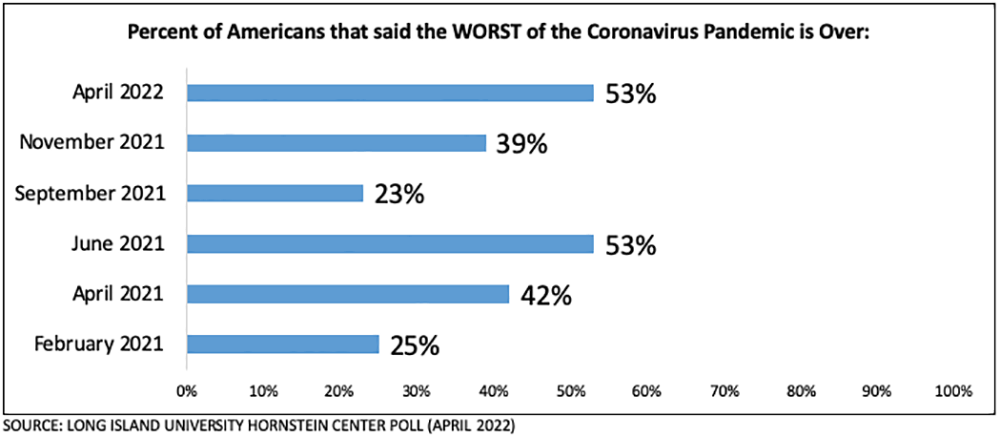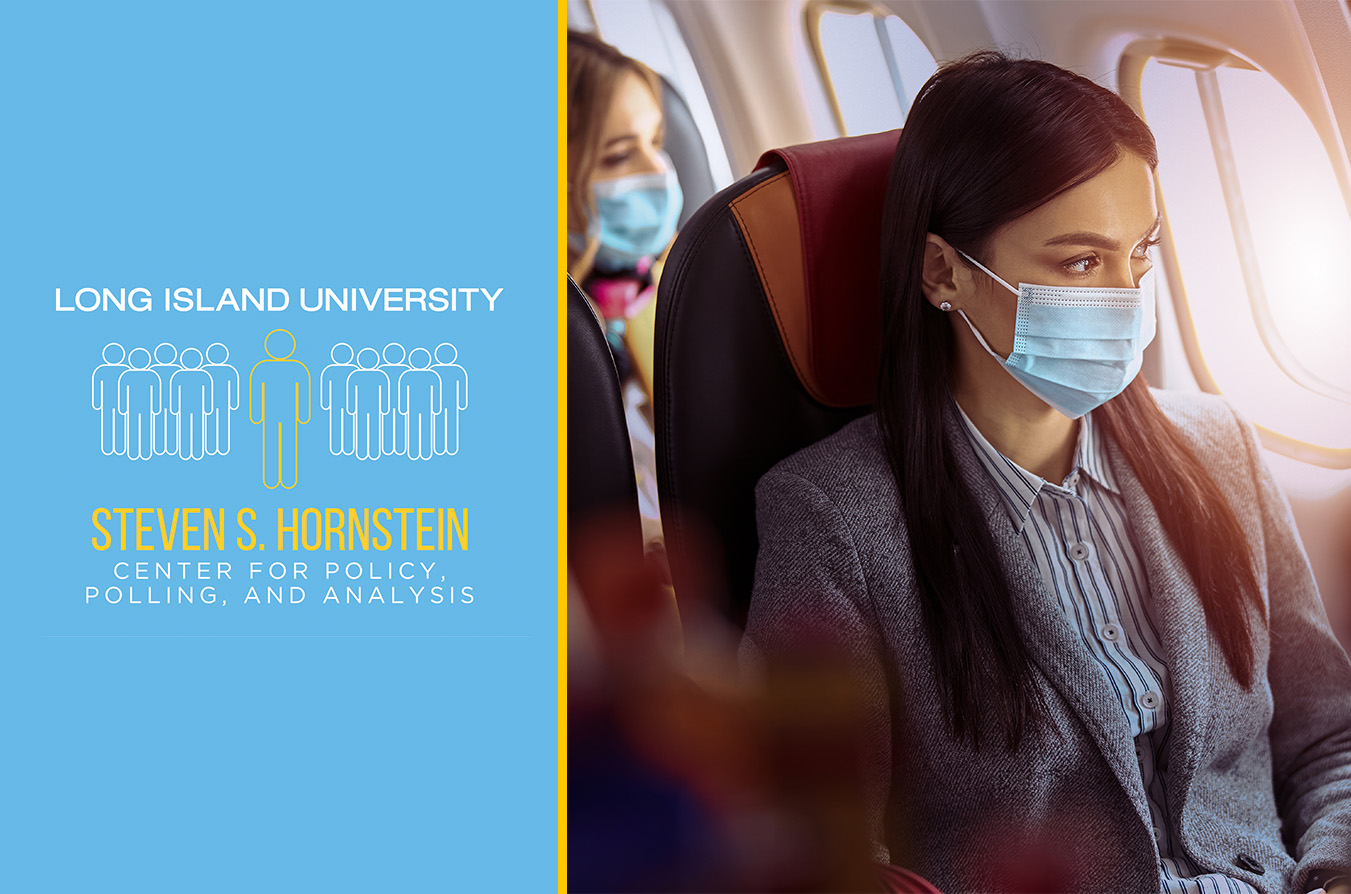Brookville, NY, (April 25, 2022): Results of a newly released Long Island University Steven S. Hornstein Center for Policy, Polling and Analysis national poll revealed what Americans think about wearing masks on planes and public transportation in light of a federal court order, that stated as of April 18, 2022, the CDC’s Order requiring masks on public transportation conveyances and at transportation hubs was no longer in effect.
PDF Format – Includes sample and methodology detail
MIXED SUPPORT (42%) ON THE REMOVAL OF MASK MANDATES ONBOARD AIRLINE FLIGHTS
Americans were asked if they supported the removal of mask mandates onboard airline flights to reduce the likelihood of contracting the coronavirus; 42% of respondents said yes. Respondents with the highest support of the mask mandate removal were Republicans (73%), followed by Independents (41%) and Democrats (21%). Support of the mask mandate removal was higher in the Midwest (48%) and South (47%) than other regions in the Northeast (33%) and Pacific (35%). Respondents age 60 and older supported the mask mandate removal at a lower rate (34%) than other age brackets. Males supported the mask mandate removal at a higher rate (46%) than females (39%).
6 OUT OF 10 AMERICANS WOULD STILL WEAR A MASK WHILE TRAVELING

National poll results found that 64% of respondents said they would still wear a mask today if traveling by plane; 63% of respondents said they would still wear a mask today if traveling on public transportation. Political beliefs played a factor in respondents’ choices: 87% of Democrats said they would still wear masks on planes; 84% of Democrats said they would still wear masks on public transportation; 61% of Independents said they would still wear masks on planes; 59% of Independents said they would still wear masks on public transportation; 38% of Republicans said they would still wear masks on planes; 41% of Republicans said they would still wear masks on public transportation.
71% OF AMERICANS BELIEVE WEARING MASKS REDUCES THE LIKELIHOOD OF CONTRACTING THE CORONAVIRUS
Respondents were asked if they believe wearing face masks reduces the likelihood of contracting the coronavirus: 71% of Americans said yes; 92% of Democrats said yes; 68% of Independents/Other said yes; 46% of Republicans said yes.
HALF OF AMERICANS (53%) SAID THE WORST OF THE CORONAVIRUS PANDEMIC IS OVER

Respondents were asked if they believe the worst of the pandemic is over. Overall, 53% of respondents said yes, the highest since June 2021 through national polls conducted by the Long Island University Steven S. Hornstein Center for Policy, Polling and Analysis. Respondents with the highest confidence level that the worst of the coronavirus pandemic is over are Republicans (70%), followed by Independents (51%) and Democrats (43%). Respondents age 18-29 believe the worst is over at the highest belief rate (58%) compared to respondents age 60 and older (47%) at the lowest belief rate. Males believe the worst is over at a higher rate (57%) than females (49%).
53% OF AMERICANS SAID THEY CURRENTLY WEAR A MASK TO AVOID CONTRACTING THE CORONAVIRUS
Respondents were asked if they were currently wearing a mask in general to reduce the likelihood of contracting the coronavirus: 53% of Americans said yes; 73% of Democrats said yes; 48% of Independents/Other said yes; 34% of Republicans said yes.
62% OF AMERICANS REMAINED CONCERNED OVER RISK OF FAMILY CONTRACTING THE CORONAVIRUS (DOWN SLIGHTLY FROM 69% IN NOVEMBER 2021)
Americans were asked how concerned they are about someone in their family becoming seriously ill from the coronavirus: 62% of respondents said they are somewhat or seriously concerned as compared to 69% in an earlier November 2021 Hornstein Center national poll. 78% of Democrats, 59% of Independents/Other, and 43% of Republicans said they are somewhat or seriously concerned.
75% OF AMERICANS ARE FULLY VACCINATED AGE 12 AND OVER (UP FROM 69% IN NOVEMBER 2021)
76% OF AMERICANS ARE FULLY VACCINATED AGE 18 AND OVER (UP FROM 71% IN NOVEMBER 2021)
90% OF AMERICANS ARE FULLY VACCINATED AGE 65 AND OVER (UP FROM 86% IN NOVEMBER 2021)
According to CDC data, 75% of Americans age 12 and over are fully vaccinated as of April 24, 2022 (up from 69% on November 16, 2021). 76% of Americans age 18 and over are fully vaccinated (up from 71% on November 16, 2021). 90% of Americans over age 65 are fully vaccinated (up from 86% on November 16, 2021), indicating a promising way forward for the most at-risk population.
CDC AUTHORIZED COVID-19 BOOSTER VACCINES
CDC guidance on COVID-19 Booster Vaccines stated that Americans eligible for a second booster shot include adults ages 50 years and older, people ages 12 years and older who are moderately or severely immunocompromised, and people who received 2 doses (1 primary dose and 1 booster) of Johnson & Johnson’s Janssen vaccine. Currently, the three vaccines that are authorized and recommended to prevent COVID-19 by the CDC are Pfizer-BioNTech COVID-19 vaccine, Moderna COVID-19 vaccine and Johnson & Johnson’s Janssen COVID-19 Vaccine.
METHODOLOGY
This Long Island University Steven S. Hornstein Center for Policy, Polling, and Analysis online poll was conducted through SurveyMonkey from April 21 – 22, 2022 among a national sample of 1,584 adults ages 18 and up. Respondents for this survey were selected from over 2.5 million people who take surveys on the SurveyMonkey platform each day. Data for this week have been weighted for age and gender using the Census Bureau’s American Community Survey to reflect the demographic composition of the United States. The modeled error estimate for this survey is plus or minus 2.5 percentage points.
ABOUT THE LONG ISLAND UNIVERSITY STEVEN S. HORNSTEIN CENTER FOR POLICY, POLLING, AND ANALYSIS
The Long Island University Steven S. Hornstein Center for Policy, Polling, and Analysis conducts independent polling, empirical research, and analysis on a wide range of public issues. Our studies inform the public and policy makers about critical issues, attitudes, and trends shaping the world. Visit liu.edu/Hornstein for more information and results from this national poll.
ABOUT LONG ISLAND UNIVERSITY
Long Island University, founded in 1926, continues to redefine higher education, providing high-quality academic instruction by world-class faculty. Recognized by Forbes for its emphasis on experiential learning and by the Brookings Institution for its “value added” to student outcomes, LIU has a network of over 285,000 alumni, including industry leaders and entrepreneurs around the globe. Visit liu.edu for more information.



